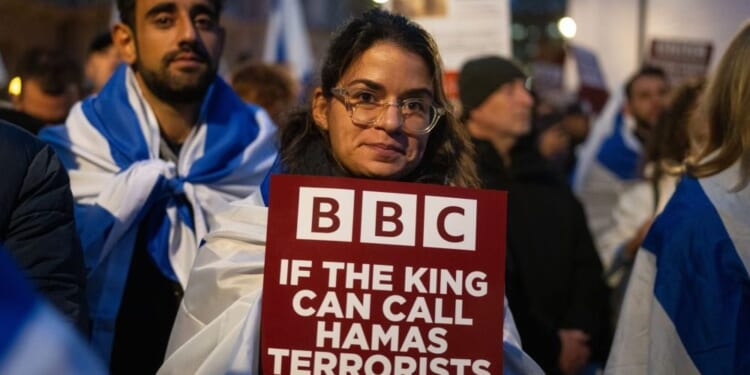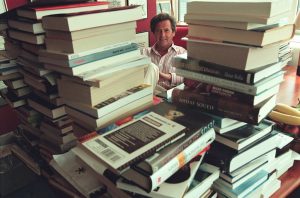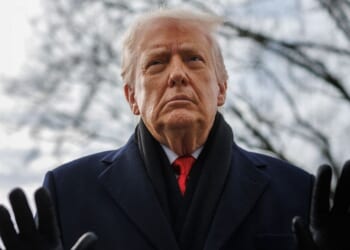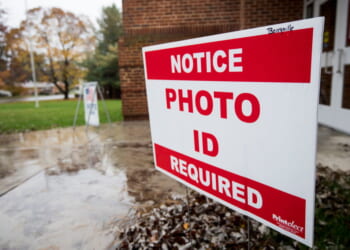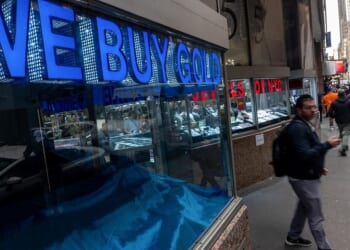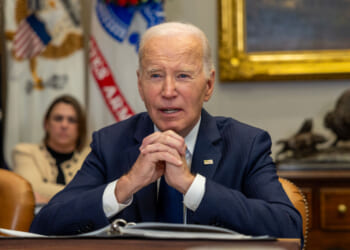Since the BBC was founded, there have been 17 Directors-General. Tim Davie was the 17th and he is also the third DG in a row to become entangled in journalistic scandal.
This is not a coincidence, or bad luck, or the work of the Corporation’s enemies. Rather, it is the clearest possible evidence that there is something rotten in the very core of the organisation. Davie says he’s going to hang on to ensure a smooth succession; someone else will have to rescue an Auntie in distress. But unless there is now root-and-branch reform at the Corporation, it is difficult to see how this damaging cycle of failure can be broken.
The dossier that triggered Davie’s resignation, along with that of Deborah Turness, BBC News’s chief executive, was put together by Michael Prescott for the Editorial Standards and Guidelines Committee. Prescott was an independent adviser to the committee; he resigned earlier this year after presenting his damning evidence of journalistic malfeasance.
As the BBC never tires of telling us, it is devoted entirely to truth-telling, even setting up a special unit — BBC Verify — to establish the veracity of claims. Prescott’s dossier mocks those pretensions, showing the BBC to be a whited sepulchre: proclaiming its virtue while churning out propaganda. A more thoroughgoing betrayal of the BBC’s journalistic credo would be hard to imagine.
Given all this, Tim Davie’s resignation was probably inevitable. After days of silence, he was at some point going to have to break cover and explain himself. But in light of Prescott’s dossier, his position was indefensible. How, after all, can you defend your organisation when it’s been caught out so badly? The doctoring of quotes, which Panorama was revealed to have done to Donald Trump, was exactly the kind of thing that was routine in the Soviet Union; every honest BBC journalist (and there are plenty) should feel soiled by association with that kind of technique.
Even so, Davie and Turness might have survived had they acted quickly. Both of them, along with some other senior figures, had been in possession of the facts since May. Why was no action taken? Prescott himself says that when he presented his evidence he was met with defensive indifference. Presumably they hoped and believed his dossier would never see the light of day. When, last week, it did, in the pages of The Daily Telegraph, the BBC’s response was calamitously stupid. Its first comment was “we do not comment on leaks”; can you imagine what the BBC’s response would be if a government tried that line out? However, when Trump himself stepped into the fray, there was surely no alternative: Davie had to go.
There will be no shortage of applicants to replace him — leading the BBC is one of the glittering prizes in British public life — but no one will succeed in the job unless there is radical change. This crisis should be viewed as an opportunity to put things right. Now is the moment to begin a long-overdue process of reform. Firstly, the Corporation must come clean about the problem it faces; it cannot go on repeating, ad nauseam, that “we are independent, impartial and truthful” — how can we believe them? In 2007, I wrote Can We Trust the BBC?, based on my 25 years as a BBC reporter. My answer then, as it is now, is that you cannot trust the BBC to be impartial because it is staffed, overwhelmingly, by young-ish people who are liberal-Left in outlook. They are highly educated, and many are hyper-political and hyper-sensitive, quite happy to activate complaints on the basis of micro-aggressions, trigger warnings and cultural appropriation.
The new DG (very possibly a woman) will get nowhere with reform until that bias in BBC newsrooms is admitted. If this first, difficult step is taken, then the hard work can start. Proper reform must overcome the BBC’s extreme reluctance to submit to outside scrutiny; it is very jealous of its prerogatives. A common feature of all the recent scandals is that they have all been handled internally. Complaints from outsiders go through a bureaucratic grinder, complainants rarely get satisfaction, and most find the process utterly frustrating. Dismantling this mechanism and letting outsiders sit in judgement would go some way to restoring trust.
When there are major journalistic lapses, meanwhile, it would be much better if a panel of tough, independent people — preferably a mix of journalists, lay people and perhaps a lawyer or two — got to assess the evidence. If there has been wrongdoing, it would be admitted quickly and openly, and those responsible would be disciplined, or indeed sacked in the most serious instances. If such a process had been employed in response to the Prescott dossier, the BBC would now be in a very different place.
Then there is the question of recruitment. The Corporation’s newsrooms are largely Left-liberal mono-cultures. “Impartiality”, if it can ever be achieved, will certainly never be realised in an organisation where there is no proper diversity of opinion — or at the very least an open-minded curiosity, rather than suffocating group-think. This needs to be addressed.
None of this is easy, and the steps I suggest would meet fierce and determined resistance. That resistance is already in full voice, as Today programme presenter Nick Robinson encouraged another BBC presenter, David Yelland, to hammer home the message that Davie’s resignation was evidence of a “coup” at the BBC, and that sinister Right-wing forces were meddling in Corporation matters. Mark Damazer, a former controller of Radio Four, was also wheeled out to tell us that the BBC is staffed by journalistic paragons who, day-in-day-out, reflect the world with pristine impartiality. This first reaction to Davie’s resignation is discouraging: once again the BBC is rejecting, even in the face of hard evidence, that it has any problem with impartiality. Instead, it attacks its critics.
The latest irritating BBC promo — the one that bigs-up the bravery and resourcefulness of its journalists — contains the line, “This is our BBC”. I think this is meant to sound inclusive. But it sounds more like the BBC is saying it belongs to its staff: which is exactly the nub of the problem. To succeed, rather, the BBC needs to think and sound more like the country it serves, not like the progressive bully-pulpit it has become. And if this opportunity for meaningful reform is ignored once again, the 18th Director-General risks being the last.
a.appcomments {
background: #FFF;
border: 1px solid #446c76 !important;
font-family: benton-sans,sans-serif;
font-weight: 600;
font-style: normal;
font-size: 12px;
color: #446c76 !important;
padding: 12px 50px;
text-transform: uppercase;
letter-spacing: 1.5px;
text-decoration: none;
width: 100%;
display: block;
text-align: center !important;
}

